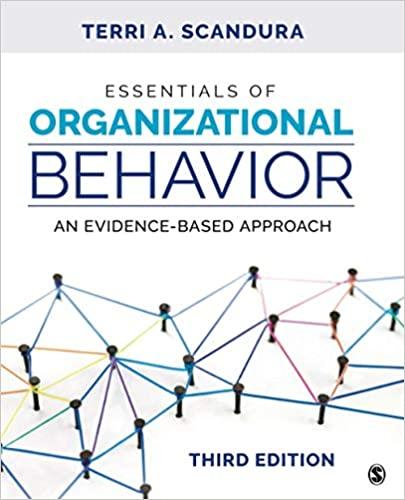Its hard to know what to look out for in organizationswhich conflict should be addressed and which
Question:
It’s hard to know what to look out for in organizations—which conflict should be addressed and which conflict is a minefield that should be avoided. While diverse views are valued and can be productive, some conflict is destructive. How can you know the difference? Here are some things to look out for. Conflict may escalate into intense arguments. When you experience personal attacks, ranting, or name-calling, it constitutes verbal abuse. Look for contempt from the other party, character attacks rather than a focus on the task, closedmindedness, and the refusal to answer questions. When this is happening, it is impossible to be productive. You cannot reason with a person engaging in verbal abuse. It is recommended to call them on it directly by saying something like, “Stop calling me names.” If it continues, you may need to contact your Human Resources Department. One person in a conflict says they want to discuss it and resolve it, but the other person avoids the conversation. They bury their head in the sand like an ostrich. Because this is one-sided, it is unlikely that the conflict will get addressed. Over time, the problem gets worse because resentment builds. Issues are ignored because one person denies they exist, changes the subject, or may even avoid the other person that brought the conflict to their attention. It may be necessary to have a manager or a person from the Human Resources Department step in to listen and get the conversation started. When one party tries to address the conflict, the other party blames it on them. For example, you ask your coworker why they are not completing their part of a project, and they respond by saying, “The data you gave me for the report was a mess, so I just didn’t do it.” This can become a real problem, because you feel like you want to come back at them with, “Well, maybe you should have told me this right away rather than waiting a week!” The blame game can escalate with such accusations leading to stress. Try to respond productively when being blamed by using “I” rather than “You.” Try saying, “I feel frustrated because I didn’t know about the organization of the data.” Share your point of view without responding with more blaming....
Discussion Questions
1. Of the minefields described, which one do you feel is the most problematic and why?
2. Explain the differences in how you would respond if the conflict minefield was with a coworker. A customer? Your boss?
3. Give an example of a conflict you have experienced that did not get resolved (this can be with a classmate, roommate, family member, or coworker). What are the effects of avoiding the conflict? List some steps you might take to resolve it.
Step by Step Answer:

Essentials Of Organizational Behavior An Evidence-Based Approach
ISBN: 9781544396781
3rd Edition
Authors: Terri A. Scandura





